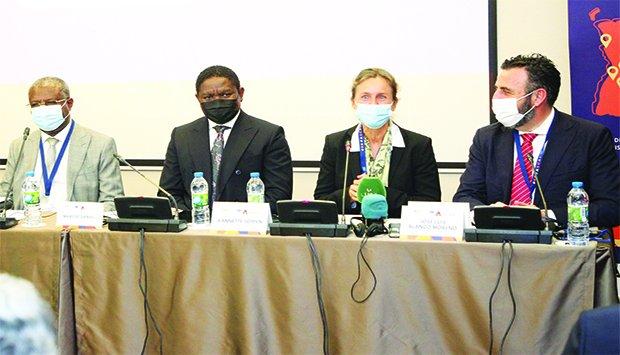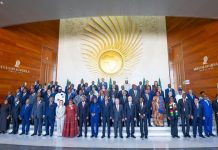Africa-Press – Angola. The Ministry of Territorial Administration (MAT), in partnership with the European Union, launched, this Wednesday (2), in Luanda, a project that aims to strengthen the participation of civil society, in particular the most represented groups, with emphasis on women, in decision-making and governance platforms.
The Support Project for Civil Society and Local Administration (PASCAL) will initially benefit 25 municipalities in five provinces of the country and is valued at 5.8 million euros, financed by the European Union.
For the first phase of the programme, 25 municipalities in the provinces of Benguela, Huambo, Huíla, Malanje and Luanda were selected.
According to a statement from the Ministry of Territorial Administration, to which Jornal de Angola had access, the Project is part of national and European Union policies for the consolidation of civil society, decentralization and development.
The Project, according to the document, aims to contribute to the country’s economic growth and social development, through an inclusive, heterogeneous and effective participation of civil society in the local governance process. It also aims to promote the exchange of skills and good practices between the European Union, Angola and other African and Latin American countries to support the inclusive and effective participation of citizens.
The Program will be carried out by Fundacion Internacional y para Iberoamérica de Administración y Politicas Públicas (FIIAPP – Spain) and the Central Project Management Agency (CPMA – Lithuania) and aims to increase citizen participation and collaboration in local governance, in order to achieve milestones coexistence and strengthen democratic mechanisms.
Speaking at the PASCAL launch ceremony, the Secretary of State for Local Authorities, Márcio Daniel, highlighted the constructive contribution to ensuring an inclusive, heterogeneous and effective participation of civil society in the governance process. The 25 municipalities, he explained, will be tested to see how the program will work and thus learn from the results. Then, if financial resources allow, he said, the project will be expanded to other municipalities.
Márcio Daniel underlined that “the quality of democracy depends, to a large extent, on the quality of its actors”. quality of Angolan democracy.
For the responsible, democracy is not only representative, but also participatory and it is the balanced combination of these two predicates that makes the essence of the democratic principle. “For that reason, having good laws and regulations is not wrong, but incomplete,” he added.
The great challenge that the country faces, he added, is not to elaborate and pass good laws, it is to transform the laws into a concrete reality of flesh and blood, soul and ground, in a culture of legality.
Márcio Daniel recognized the strengths of civil society and said that they can and do help to improve local governance. “There are spaces in which civil society’s ability to penetrate is much higher than that of the Executive. This collaboration is necessary and varies depending on the theme”, he said.
Apontou que o Projecto de Apoio à Sociedade Civil e a Administração Local é desafiante, sobretudo para as organizações da sociedade civil, tendo em conta a capacidade. Nisto, reforçou, o Executivo pretende manter uma interacção mais profunda e profícua com essas organizações.
Em resposta ao questionamento sobre o papel do Ministério dentro do Projecto, o secretário de Estado acrescentou aos desafios da sociedade civil o seu engajamento no PASCAL, monitoria e avaliação de projectos e políticas públicas de âmbito local.
Programa alinhado ao Plano de Desenvolvimento
In her speech, the European Union representative in Angola, Jeannette Seppen, acknowledged that the Project is in line with the Objectives of the National Development Plan 2018-2022 and the Strategic Plan for Territorial Administration.
The Program also follows the best monitoring practices with international indicators to select and compile data on the prosperity of municipalities and monitor progress towards the Sustainable Development Goals (SDGs), with emphasis on the 11th point regarding sustainable cities and communities. , the 16th for peace, justice and strong institutions, as well as strengthening global partnerships for sustainable development.
PASCAL, he stressed, also supports capacity building and relevant training actions in the design of
best practices of territorial development for the site and envisages identifying and formulating actions to “leave no one behind”, especially in rural communities.
He stressed that the program will follow the best international guidelines for urbanism and territoriality, urban planning and training of municipal leaders.
The project launched yesterday, he explained, is the result of extensive preparatory work and consultations with national institutions, from provincial, local and NGOs, traditional, religious, academic authorities, women and youth groups and platforms and representatives of minorities and groups. vulnerable.
In the program, he recalled, the FIIAPP – Spain and the CPMA have operational responsibilities for the project, which range from financial control, management of the work of experts in the field and the preparation of activities.
With the launch of PASCAL, the European Union sees its commitments fulfilled. In 2017, he noted, the European Union initialed the Declaration at the Summit of the European Union and African Union, which defined governance as one of the strategic priorities with the formal recognition of the role of civil society in this process”.
For the project’s director, Pablo López, PASCAL is based on three fundamental pillars that aim to contribute to the improvement of the legislative, regulatory and institutional framework in matters of participatory governance (that is, to support municipal administrations and public institutions in all as possible).
For More News And Analysis About Angola Follow Africa-Press






